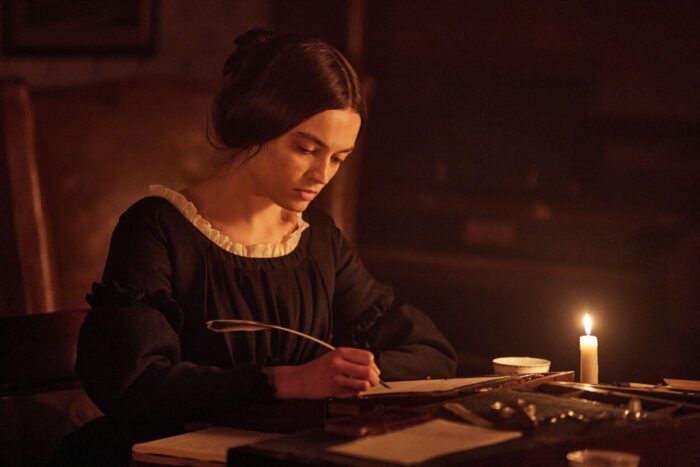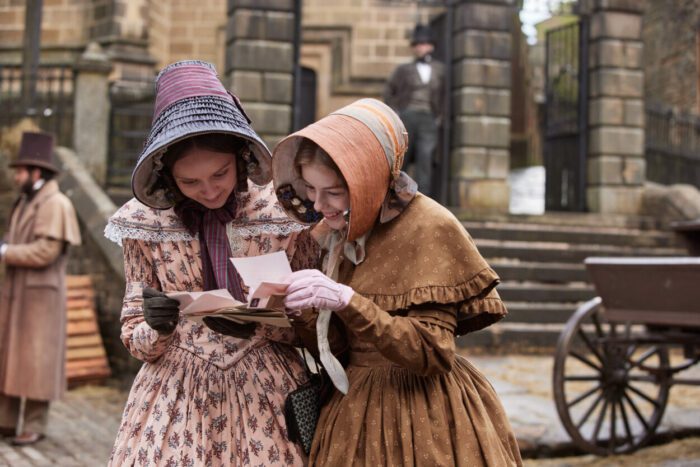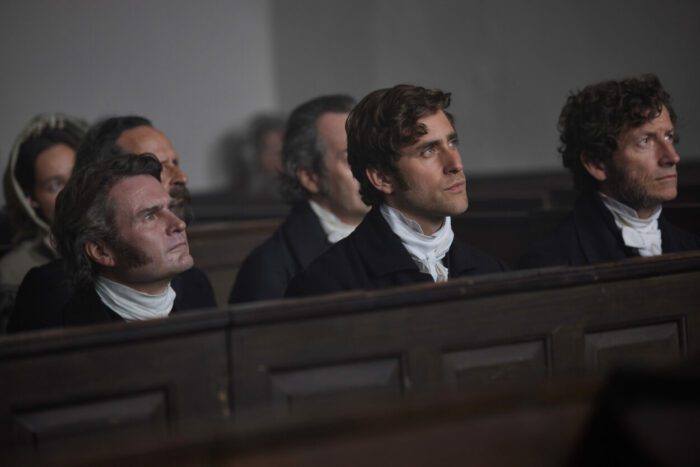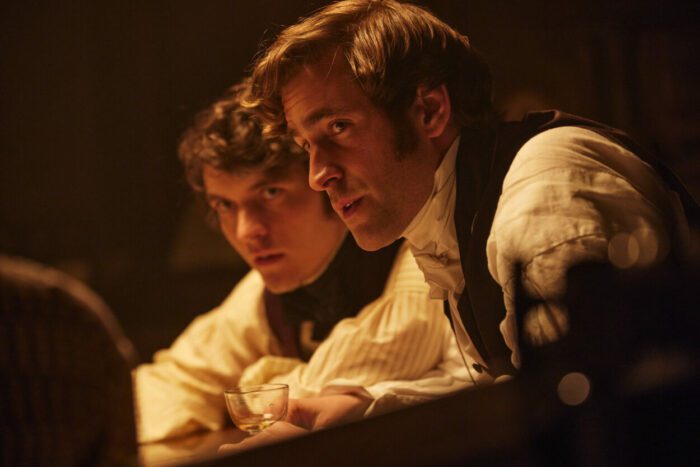The beginning of Emily takes place during the final moments of life for the titular English novelist and poet Emily Brontë. At the tender age of 30, she is refusing medical attention and lying on a couch succumbing to inflammatory effects of tuberculosis alongside her younger sister Charlotte. Emily’s lone novel, Wuthering Heights, was recently published, shocking the literary world of the time. In this fragile setting, Charlotte, who would write Jane Eyre the same year, is questioning her sister’s attitude from her volatile opus and asks, “Where did those selfish people come from?”
Pause for a moment with Emily on that dangling question. If you do not know at least a thumbnail of history on Emily Brontë and the potent themes of abusive cruelty and controversial moralities seeped throughout her hallowed classic Wuthering Heights, this film and its sweeping ambition may be lost on you from the start. The film will rewind from this deathbed and present its evidence, helping non-Brontë readers engage, but putting your nose in a book or two beforehand wouldn’t hurt.

Now, returning to that question asking about the roots of the uncaring characters created by Emily Brontë, do know that there is most certainly a story behind the story. There always is. It’s whether or not that great story has ever been spoken of or shared before beyond the privacy of family. There’s a very good chance Emily’s has only been hinted at in her own poems and wondered about deeper ever since, creating room for a movie to postulate.
Following in the transcendent footsteps of Greta Gerwig’s Little Women, award-winning actress Frances O’Connor (Mansfield Park, A.I.: Artificial Intelligence) makes her feature debut as a writer and director with Emily to blend biographical notes with envisioned dramatic license. Before her acclaim on the printed page, Emily Brontë was a lover, a sister, a daughter, and an independent woman of turmoil and ache. Anchored by a stirring lead performance from Emma Mackey, O’Connor’s emotive film seeks to flesh out that very soul.

When Emily turns its clock back, Mackey (Death on the Nile) portrays the second youngest of six siblings in a devout Protestant household led by the patriarch Patrick (TV veteran Adrian Dunbar), a man heartset on finding dignified career paths for all his children. Emily’s closest confidante is her artistically-minded brother Branwell, played by Dunkirk’s Fionn Whitehead. His nonconformist influences of alcohol, opium, tattoos, and tomfoolery fly against Emily’s earmarked path of becoming a teacher, much to the displeasure of Patrick and the aforementioned Charlotte (Alexandra Dowling of The Musketeers and Game of Thrones).
The Brontë’s hamlet of Haworth in West Yorkshire is perked up by the arrival of a new priest to the ranks of the town parish. Compared to the old fogies currently in place, William Weightman, played by Oliver Jackson-Cohen of The Invisible Man and The Lost Daughter, is an upstanding and cultured dreamboat. All the Haworth women, regardless of their age, lock their eye contact harder, turn their Bible pages quicker, and move their church fans a little faster when he’s around. Emily is oblivious to William’s charisma until she is forced by her father to take French lessons with him.

Matching a tattoo on brother’s forearm, Emily finds inspiration and solace in the notion of “freedom in thought.” With that mantra at heart, she is quick to eschew the blind faith forced upon her in home and community settings. By rebelling against what everyone is sternly told to believe, Emily is often labeled the strange one and is chided with comparisons to her straight-arrow siblings and the weight of those parental expectations for great things.
At first, William tries his level best to sermonize the apparent sin he sees in Emily’s actions and temperament during their closed sessions. In short order, though, he falls for it, against his religious devotion and better judgment. Between Emily’s inner discovery with Branwell and this spurt of external passion with William, the lushness of O’Connor’s filmmaking choices radiate. Starting with the central looks, Oscar-winning costume designer of The Duchess, Michael O’Connor, adorned the cast with bustled and creased dresses in eye-catching patterns, enhanced further by excellent hair and makeup efforts of supervisors Rachel Buxton and Lucy Cain.
Marvelous and the Black Hole cinematographer Nanu Segal absorbed the sunny and rainy elements within the rural countryside to move swiftly within natural light and close personal spaces. Emily’s scenes are given a massive sweep from the florid strings and choral backing of Till composer Abel Korzeniowski’s stupendous score. When necessary, first-time feature editor Sam Sneade cuts both the visuals and sounds with a sense of urgency to avoid the usual stiffness of costume dramas.

Brittleness will not be a word to describe Emily’s acting efforts either. With more platforms, Fionn Whitehead can easily become Britain’s answer to Timothy Chalamet. Likewise, someone needs to put Oliver Jackson-Cohen’s name on a short list for the next James Bond. Even though the former plays the impetuous dreamer and the latter plays the buttoned-up gentleman in this film, both have their sparks of greater promise.
Nevertheless, Emily is the next rightful launching pad of Emma Mackey. This is a rich leading performance calling upon a gamut of body language, screen presence, and evocative retorts. Frances O’Connor was lucky and blessed, and we can’t take our eyes off of her. Between stealing scenes in Death on the Nile and small beginnings in Eiffel and The Winter Lake, Emma, who will be seen next in the ensemble of Gerwig’s Barbie, is rapidly becoming a talent to notice and remember.
By the time Emily reconnects with its grave beginning to close the film, there is a second question asked of Charlotte following the initial one on selfish people that is finally understood. She asked, “How did you do it?” Her sister’s answers are, combined with “freedom in thought,” the confessions and writings chronicling the fraught course of events that came before this departure.
Those events are typified by a heavy break-up and the death of a beloved family member for Emily, creating very fertile, albeit painful, moods for expression. Some purists or historians may call all of this speculative historical fiction in Emily hogwash, but they would be discounting those very moods, combined with Bronte’s strict upbringing as a marginalized woman. Cultural consumers know full well the poems, songs, texts, tweets, novels, and stories written in the states of despair and anger from break-ups and death. They fill catalogs, timelines, and libraries to their brims. Emily adds Wuthering Heights to that revered list.



